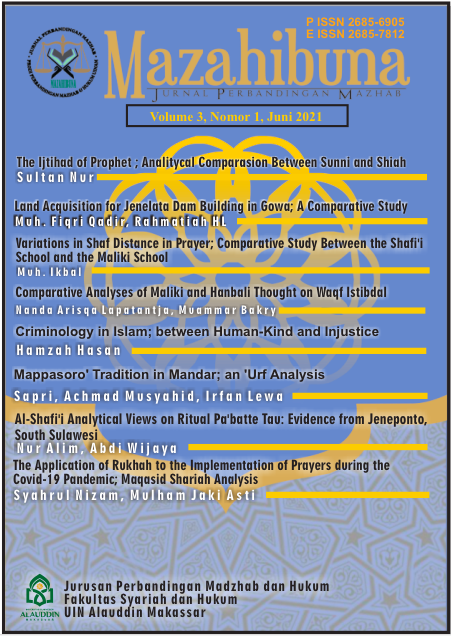Al-Shafi’i Analytical Views on Ritual Pa’batte Tau: Evidence from Jeneponto, South Sulawesi
Abstract
The background of the author in adopting this title is to find out how the review of the Syafi'i school of thought in the pa'batte tau ritual in Batujala Village, Bontoramba District, Jeneponto Regency. Then the formulation of the problem in this study are: 1). How was the pa'batte tau ritual procession in Batujala Village, Bontoramba District, Jeneponto Regency ?, 2). How do the people of Batujala Village view the pa'batte tau ritual? 3). How is the review of the Syafi'i mazhab of the pa'batte tau di ritual ?. The type or research method in this thesis is a qualitative research method. Qualitative research has three main keys, namely taking facts based on the understanding of the subject, the results of detailed observations and trying to find new theoretical results that are far from existing theories. Qualitative research or what is known as field research, starts with observation, then conducts interviews with the community to obtain accurate data or information as material for the completion of the thesis. The results of this study indicate that: 1). The people of Batujala Village still maintain the pa'batte tau ritual because they think that the tradition aims to summon rain during the prolonged dry season. 2). There are several factors why the pa'batte tau ritual in Batujala Village, Bontoramba District, Jeneponto Regency is still being maintained, one of which is the economic factor. 3). Based on the review of the Syafi'i mazhab, it has been enacted to pray istisqa if you want to call rain. The implications of the results of this study are: 1). It is necessary to instill religious values and moral values for each community so that they know which actions violate religion and which violate cultural customs. 2). The community should be more careful in deciding everything, especially in the matter of the pa'bate tau tradition so that its implementation can run according to the prevailing religion and customs. 3). This research is expected to be the preservation of the pa'batte tau tradition for the community so that no one deviates and goes outside the boundaries of religious values and even customsReferences
Koenjaraningrat, Pengantar Antropologi. Jakarta: PT Rineka Cipta, 2011
Sunanto, Musyrifah. Sejarah Peradaban Islam Indonesia. Cet. IV; Jakarta: Rajawali Pers, 2012.
Suprayono, Imam. Metologi Penelitian Sosial-Agama. Bandung: Remaja Rosda Karya, 2001.
Irham, Masturi dan Taman, Asmul, Terjemahan Kitab Ar-Risalah. Jakarta: Pustaka Al Kautsar, 2012.
Muchtar, Asmaji. Fatwa-fatwa Imam Syafi’i. Cet.I; Jakarta: Amzah, 2004.
Satih, Pakih. Imam Empat Mazhab, Cet.I; Yogyakarta: Kana Media, 2014
Syalhut, Mahmud. Fiqih Tujuh Mazhab. Cet.II; Jakarta: Lentera, 2005.
Aziz, Dahlan Abdul, Ensiklopedia Hukum. Cet, I; Jakarta: Ichtiar Baru Van Hoeve, 1996.
Zahrah, Muhammad Abu, Imam Syafi’i. Cet.II; Jakarta: Lentera, 2005.
Aziz, Dahlan Abdul. Ensiklopedia Hukum. Cet.I; Jakarta: Ichtiar Baru Van Hoeve, 1996.
Bakhtiar, Amsal. Filsafat Agama Wisata Pemikiran dan Kepercayaan Manusia. Jakarta: PT. RajaGrafindo Persada, 2009.

This work is licensed under a Creative Commons Attribution 4.0 International License.
Authors who publish with Mazahibuna: Jurnal Perbandingan Mazhab agree to the following terms:
- Authors retain copyright and grant the Mazahibuna: Jurnal Perbandingan Mazhab right of first publication with the work simultaneously licensed under Creative Commons Attribution License (CC BY 4.0) that allows others to share the work with an acknowledgment of the work's authorship and initial publication in this journal.
- Authors can enter into separate, additional contractual arrangements for the non-exclusive distribution of the published version of the work (e.g., post it to an institutional repository or edit it in a book), with an acknowledgment of its initial publication in this journal.
- Authors are permitted and encouraged to post their work online (e.g., in institutional repositories or on their website) before and during the submission process, as it can lead to productive exchanges, as well as earlier and greater citation of published work.

